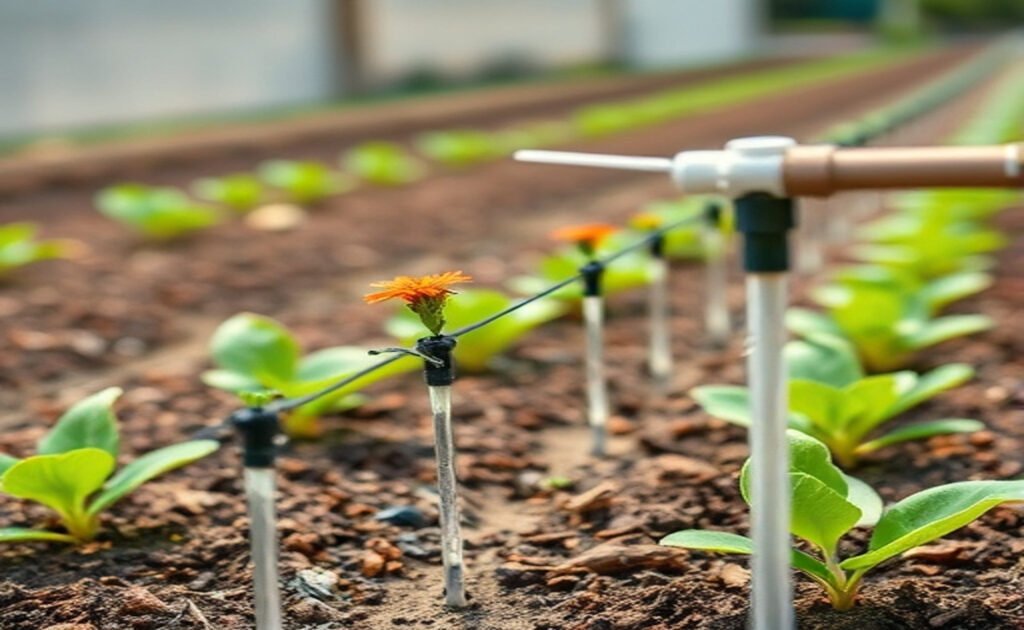Are you tired of seeing your water bill skyrocket every month? Imagine a world where you can keep your plants thriving while saving water and money. Enter the game-changing solution: drip irrigation system. This innovative watering method is revolutionizing how we nurture our gardens, farms, and landscapes.
But what exactly makes drip irrigation so special? It’s not just about conserving water; it’s a whole package of benefits that can transform your gardening or farming experience. From boosting crop yields to being environmentally friendly, drip irrigation offers a smarter way to water your plants.
In this blog post, we’ll dive into the five key benefits of drip irrigation that you simply can’t ignore. Whether you’re a home gardener or a large-scale farmer, understanding these advantages could be the key to unlocking your green thumb potential. So, let’s explore how this water-wise technique can revolutionize your approach to plant care and cultivation!
Water Conservation
Water conservation is a crucial aspect of drip irrigation, making it an invaluable tool for modern agriculture. This method offers several advantages in preserving our precious water resources:
A. Minimizes water waste
Drip irrigation significantly reduces water waste by delivering water directly to the plant’s root zone. This targeted approach ensures that water is used efficiently, minimizing runoff and overspray commonly associated with traditional irrigation methods.
B. Reduces evaporation
One of the key benefits of drip irrigation is its ability to reduce water loss through evaporation. By delivering water at ground level, less moisture is exposed to air and sunlight, resulting in:
- Lower water loss rates
- Increased water retention in the soil
- Extended intervals between watering sessions
C. Precise water delivery to plant roots
Drip irrigation excels in providing precise water delivery to plant roots. This accuracy offers several advantages:
- Optimal moisture levels for plant growth
- Reduced risk of overwatering or underwatering
- Improved nutrient uptake by plants
D. Adjustable flow rates
The ability to adjust flow rates is a significant feature of drip irrigation systems. This flexibility allows farmers and gardeners to:
| Benefit | Description |
|---|---|
| Customization | Tailor water delivery to specific plant needs |
| Efficiency | Optimize water usage based on soil type and climate |
| Adaptability | Adjust flow rates during different growth stages |
By incorporating these water conservation techniques, drip irrigation systems can help reduce water consumption by up to 50% compared to traditional irrigation methods. This not only conserves valuable water resources but also contributes to sustainable farming practices.
Improved Crop Yield
Drip irrigation not only conserves water but also significantly boosts crop yield through various mechanisms. Let’s explore how this innovative watering system enhances plant productivity.
Consistent Moisture Levels
Drip irrigation maintains optimal soil moisture, preventing fluctuations that can stress plants. This steady water supply ensures roots have continuous access to the water they need, promoting healthier growth.
Reduced Plant Stress
By delivering water directly to the root zone, drip irrigation minimizes leaf wetness, reducing the risk of fungal diseases. This targeted approach also prevents soil compaction and erosion, creating an ideal environment for root development.
Enhanced Nutrient Uptake
Drip systems can be used for fertigation, the process of applying liquid fertilizers along with irrigation water. This method increases nutrient absorption efficiency, as nutrients are delivered directly to the root zone.
| Benefit | Traditional Irrigation | Drip Irrigation |
|---|---|---|
| Water Use Efficiency | Lower | Higher |
| Nutrient Delivery | Less precise | Targeted |
| Disease Risk | Higher | Lower |
Faster Plant Growth
The combination of consistent moisture and efficient nutrient delivery accelerates plant growth. Plants can focus their energy on development rather than struggling to access water and nutrients.
Extended Growing Seasons
Drip irrigation allows for precise climate control, enabling farmers to:
- Start planting earlier in the season
- Extend harvests later into the year
- Cultivate crops in challenging environments
This flexibility can lead to increased annual yields and the ability to grow a wider variety of crops. With these advantages, it’s clear why drip irrigation is becoming increasingly popular among farmers seeking to maximize their crop output.
Cost-Effective Farming
Drip irrigation not only conserves water but also proves to be a highly cost-effective solution for farmers. Let’s explore the various ways this innovative system helps reduce expenses and maximize profits.
Lower labor costs
Drip irrigation significantly reduces the need for manual labor in farming operations. Unlike traditional irrigation methods that require constant monitoring and adjustment, drip systems can be automated, freeing up valuable time and resources. This automation leads to:
- Reduced workforce requirements
- Decreased time spent on irrigation tasks
- More efficient allocation of labor to other critical farming activities
Reduced energy consumption
One of the most significant advantages of drip irrigation is its energy efficiency. Compared to conventional irrigation methods, drip systems:
- Operate at lower pressures
- Require smaller pumps
- Consume less electricity
| Irrigation Method | Energy Consumption |
|---|---|
| Drip Irrigation | Low |
| Sprinkler Systems | Medium |
| Flood Irrigation | High |
Minimized fertilizer waste
Drip irrigation allows for precise application of fertilizers, known as fertigation. This targeted approach results in:
- Reduced fertilizer usage
- Improved nutrient uptake by plants
- Decreased runoff and groundwater contamination
Decreased weed growth
By delivering water directly to the plant roots, drip irrigation minimizes water availability to weeds. This leads to:
- Reduced weed competition
- Lower herbicide costs
- Improved crop yield and quality
With these cost-saving benefits, drip irrigation proves to be an excellent investment for farmers looking to optimize their operations and increase profitability. Next, we’ll explore the versatility of drip irrigation systems in various agricultural applications.
Versatility in Application
Drip irrigation stands out as a versatile solution for various agricultural needs. Its adaptability makes it an excellent choice for farmers across different landscapes and crop types.
Suitable for various terrains
Drip irrigation systems can be installed on:
- Flat lands
- Sloping fields
- Hilly areas
- Greenhouses
This flexibility allows farmers to optimize water usage regardless of their land’s topography.
Adaptable to different crop types
The system’s versatility extends to crop compatibility:
| Crop Type | Benefits of Drip Irrigation |
|---|---|
| Row crops | Precise water delivery to roots |
| Orchards | Targeted irrigation for individual trees |
| Vegetables | Controlled moisture for delicate plants |
| Vines | Efficient watering in narrow spaces |
Scalable for small to large farms
Drip irrigation systems can be:
- Easily expanded as farms grow
- Customized for small garden plots
- Designed for large commercial operations
This scalability ensures that farmers of all sizes can benefit from the technology.
Compatible with automation systems
Modern drip irrigation integrates well with:
- Smart sensors for soil moisture monitoring
- Automated scheduling systems
- Weather-based control units
- Mobile apps for remote management
These features enhance efficiency and allow farmers to fine-tune their irrigation practices based on real-time data.
Now that we’ve explored the versatility of drip irrigation, let’s examine its environmental benefits in the next section.
Environmental Benefits
Drip irrigation not only benefits crops and farmers but also has significant positive impacts on the environment. Let’s explore these eco-friendly advantages:
Reduced Soil Erosion
Drip irrigation delivers water directly to plant roots, minimizing surface runoff and preventing soil erosion. This targeted approach helps maintain soil structure and stability, preserving valuable topsoil.
Minimized Pesticide Runoff
By delivering water and nutrients precisely where needed, drip irrigation reduces the likelihood of pesticides being washed away. This leads to:
- Less contamination of nearby water bodies
- Improved ecosystem health
- Reduced impact on non-target organisms
Lower Greenhouse Gas Emissions
Drip irrigation contributes to lower greenhouse gas emissions in several ways:
- Reduced energy consumption for pumping water
- Decreased need for fertilizers, which require energy-intensive production
- Improved plant growth, leading to increased carbon sequestration
Improved Soil Health
The precise application of water and nutrients in drip irrigation systems promotes:
- Better soil structure
- Enhanced microbial activity
- Improved nutrient cycling
Conservation of Natural Habitats
| Benefit | Description |
|---|---|
| Water savings | Less water diverted from natural sources |
| Reduced agricultural expansion | Higher yields mean less land needed for farming |
| Minimized chemical use | Lower impact on surrounding ecosystems |
By using water more efficiently and reducing the need for agricultural expansion, drip irrigation helps preserve natural habitats and biodiversity.
Now that we’ve explored the environmental benefits of drip irrigation, let’s recap the key advantages this innovative farming method offers.
Drip irrigation stands out as a game-changing technology in modern agriculture, offering multiple advantages for farmers and gardeners alike. By delivering water directly to plant roots, this method conserves water, boosts crop yields, and reduces overall farming costs. Its versatility allows for use across various terrains and crop types, making it an ideal solution for diverse agricultural needs. Moreover, drip irrigation contributes to environmental sustainability by minimizing water waste and reducing the need for harmful pesticides and fertilizers.
As water scarcity becomes an increasingly pressing global issue, adopting efficient irrigation methods is more crucial than ever. Implementing drip irrigation not only benefits individual farmers but also contributes to broader water conservation efforts. Whether you’re a commercial farmer or a home gardener, consider making the switch to drip irrigation to enjoy its numerous benefits while playing your part in sustainable water management.
At Brownfield Multipack, we offer innovative mulch films designed to enhance your farming productivity and sustainability. Partner with us to grow healthier crops while caring for the environment.






